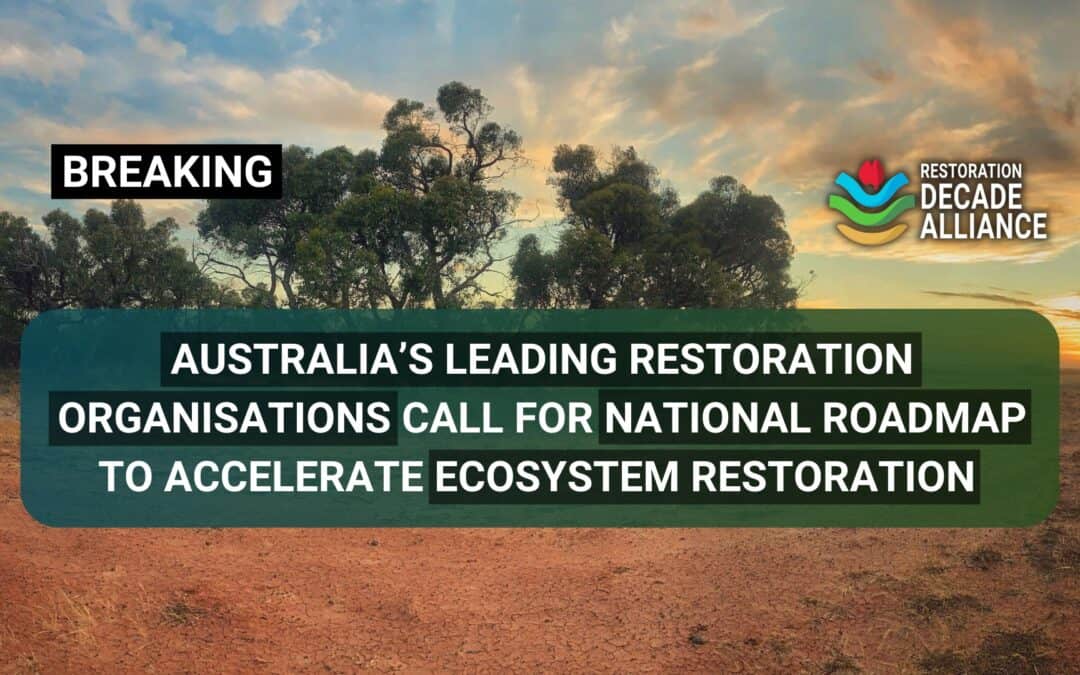The ANPC is proud to be part of an alliance of 21 leading Australian environmental organisations
calling for a national plan for ecosystem restoration to guide and accelerate action to
reverse environmental degradation, curb biodiversity loss, and mitigate the impacts of
climate change.
The Restoration Decade Alliance has issued a Statement off the back of the 10th World
Conference on Ecological Restoration (SER2023) held in Darwin on 26-30 September as
part of the UN Decade on Ecosystem Restoration 2021-2030.
“Despite ongoing efforts, our ecosystems are continuing to deteriorate, and biodiversity
is disappearing at an unprecedented rate in Australia and worldwide. We need to
urgently accelerate and amplify our collective efforts to reverse ecosystem degradation
and decline at the vast scale needed for nature and people,” says Dr Tein McDonald,
Convener of the Restoration Decade Alliance.
Roughly half of Australia’s gross domestic product is dependent on nature, and
ecosystem degradation has been shown to have direct and significant impacts on
human health and social and cultural wellbeing.
“The Restoration Decade Alliance was formed to help meet these challenges, but we
cannot do it alone. To date, restoration efforts in Australia have typically been
short-term, disconnected, and relatively small-scale. This is inadequate to address the
scale of the challenges we now face, but it’s not too late to turn things around,” says Dr
McDonald.
“The UN Decade calls on all levels of society and sectors – government, industry, First
Nations Australians, and local communities – to work together to restore our
ecosystems. We encourage the government to take the lead by developing an ambitious
National Restoration Plan that serves as a clear roadmap for effective restoration and
unites and empowers the whole-of-community.”
The RDA understands that genuine, early, and continuous involvement of First Nations
Australians is fundamental to the success of the development and implementation of
this restoration plan for Australia.
Professor Brendan Mackey from Griffith University says that restoration is also vital for
helping Australia to meet its commitments to the Global Biodiversity Framework, UN
Sustainable Development Goals and Paris Climate Agreement.
“We have a huge opportunity during the UN Decade to not just restore our ecosystems,
but to reduce and remove the threats that continue to degrade them – such as feral
animals, weeds, and unsustainable land and water management. We already have the
science and on-ground experience, traditional knowledge, tools, and community needed
in Australia to restore our ecosystems and maintain the essential functions they
perform, such as carbon removal and storage, pollination, water filtration, and habitats
for native wildlife. What we need now is substantial additional resourcing and a plan
that draws all of those different components and people together to translate that into
widespread action that fixes the problems faster than we are creating them.”
The restoration plan is required to provide a framework to guide ecosystem restoration
in Australia across government, non-government, industry, First Nations communities,
and local communities to ensure all investments are optimised to directly support
Australia’s national commitments and drive nature-positive outcomes.
“People in communities across Australia have a high willingness to take action on the
ground. What these communities need is a supportive framework, greater investment,
and attractive incentives to scale up their efforts. Alongside this, we need to do better at
communicating the benefits of reviving culture and restoring biodiversity, celebrating the
wins so that people are motivated by a message of hope,” said Dr Kristin den Exter,
Partnerships Manager of the National Landcare Network. “We have a chance to secure
a sustained stewardship of Australian ecosystems and leave a legacy that lasts beyond
this UN Decade.”
The Restoration Decade Alliance is also recommending that any government advisory
panel tasked with identifying restoration targets and priorities includes independent
ecosystem restoration experts. This Advisory Panel should include independent
ecosystem restoration experts with long and successful experience in the restoration
sector to optimise potential for successful outcomes that align with Australia’s national
and global environmental and climate commitments.
The full conference Statement can be viewed at the following link and a Discussion
Paper will be released in the near future.
https://restorationdecadealliance.org/statement-from-ser2023/
Text and image source: Restoration Decade Alliance

